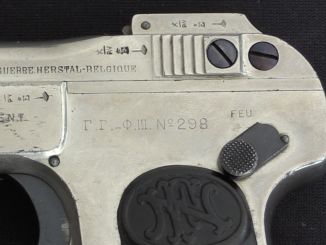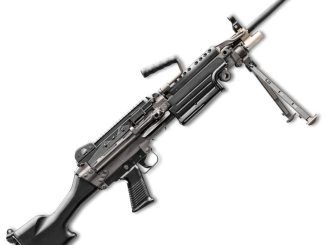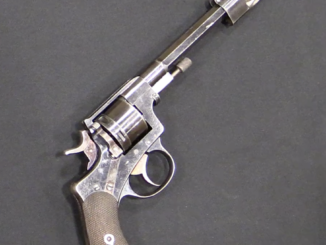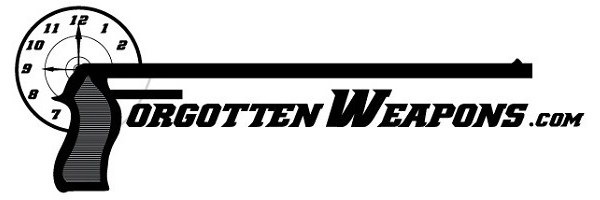Having taken a look at the history and mechanics of the P90 yesterday, I’m taking it out to the range today. I wasn’t sure how I would feel about the progressive trigger…
Related Articles

Semiauto pistol
FN 1900 for the Russian Imperial Army Fencing & Gymnastics School
We have an FN 1900 to look at today that was purchased by the Russian Imperial Army’s primary Gymnastics and Fencing School (Главная гимнастическо-фехтовальная школа). That was an institution established in 1909 to train officers […]

Uncategorized
FN M249S Semiauto for Military Collectors
Get Entered to WIN this insane FN M249S! https://go.getenteredtowin.com/forgottenweapons DEADLINE to ENTER is 07/26/24 @ 11:59pm (PST). In 2015, FN USA introduced a Military Collector product line – semiautomatic versions of their military contract small […]

Bayonet
Revolver with a Bayonet: Luxembourg Model 1884 Gendarmerie Nagant
I previously filmed one of the Model 1884 Luxembourg Gendarmerie Nagant revolvers, but I got my hands on one with the original bayonet, and I wanted to show you that. These are extremely rare revolvers, […]

Fun gun. I not only shot it but also took the armorer’s course on it.
As always, nice, thoughtful review. Thank you.
With some past criminal activity in the U.S. having utilized body armor, and presumably more in the future, a police force would need to have an effective weapon such as the P90. One which could penetrate body armor, but not over penetrate buildings, vehicles, etc. This appears to be a good urban weapon. Compact for storage in a cruiser or trunk, easy to deploy without too much fanfare. The P90 (and it’s cartridge) seems appropriate, over patrol carbines that over penetrate with 5.56 at close to medium ranges.
If its benefits to cooks and drivers are equivocal, what possible use can Special Operations forces have for it?
Special Operations does a lot of close in, personal contact. Plus, they are always looking for a physically compact weapon as well. I suspect they have situations were over penetration is not a good thing.
I suspect the 50 round magazines and the number that can easily be carried has an influence.
Cooking and driving obviously.
The equivocal part w/re cooks and drivers is not, “is it beneficial?” but “is it worth the cost?” The P90 is a new gun that you have to pay at least factory wholesale for, and then you have to set up your logistics to reliably deliver a new cartridge that isn’t offered by Wolf or Tula or Pakistani Ordnance or whomever. And everybody who has a bunch of cooks and truck drivers to arm, already has a bunch of 9mm SMGs or whatever they were using before, with a hundred million or so rounds of ammunition in depots. How much is e.g. the Norwegian MOD actually going to pay to give its cooks and truck drivers an edge against Russian paratroops, and what are they going to cut to free up the budget for that?
Special Operations forces, have a much easier time getting money for whatever special kit they think is important. If they’re still asking for P90s a generation after their introduction, that’s a good sign that the weapon delivers on the (close-quarters) battlefield.
“If its benefits to cooks and drivers are equivocal, what possible use can Special Operations forces have for it?”
They always want the latest shiny toy, regardless of the cost, regardless of the fact they already have yesterday’s latest shiny toy, regardless of the miniscule amount of improvement, because “we’re so special” that we have to have non-general issue equipment for everything. Some of it is justified, most isn’t and the result is money pissed away constantly. Firearms in particular seem especially liable to this. No sooner is something touted as the greatest advance since the invention of gunpowder adopted than we hear about its faults and “we need something better”. Think about it, what fantastic upgrades have you seen to firearms in the last couple of decades? Face it folks, after 6 or 7 centuries of development, just about everything practical has been tried and we have reached a plateau in the development of using combustion products to push an object down a tube to inflict damage at the end of flight. The room for improvement is miniscule and the costs horrendous. That’s why the P90 was adopted only by its home country – it’s an expensive solution looking for a problem. When you are buying firearms by the thousand or even by the million, that makes a difference. I’m not sure what comes next – the USN has just canned its rail gun project and I can remember an Infantry Magazine article from the early Seventies with a title of “Beams Will Almost Certainly Be Used To Kill…But Not Anytime Soon”, Guided projectiles from small arms? Hugely expensive and didn’t we try something close with the failed XM25 grenade launcher?
Wise words, yes this is the reality.
So-called “tubular assaults” in the interiors of aircraft, trains, buses, [planes, trains and automobiles!], narrow building interiors, e.g. staircases, shafts, tunnels, hall ways, etc.
Robots or drones may take on these jobs. Till then..
Someone to try a heavier caliber,bolt locking device,longer barrel, desert eagle-style gas piston e.t.c. ?
To get more complete picture, it would be nice to place in target area some pork chops and oranges wrapped in denim. 🙂
The guy who does that demonstrated the clear superiority of .22TCM (which fits into conventional handgun and SMG mags) velocity and terminal effect 😉
I know, your favored round 🙂
Here is comparo of both rounds; they happen to have same bullet weight with similar muzzle velocity, minus different construction (soft tip for 22TCM). For pistol application the latter is a better choice, no doubt.
https://www.youtube.com/watch?v=U0ftCeyAJTs
It’s not my favorite, nor even in the top three. It’s just overwhelmingly superior to 5.7 in every respect (except the amazing P90 mag). No magnum-length OAL or fence-slat pistol magazines; no rifle-like pressures* requiring weird mechanisms; no proprietary and non-reloading-friendly magic plastic coating.
The reviewer in your linked video quoted a 5.7 velocity that’s in the TCM ballpark, but didn’t actually chrono it. He’s likely reciting a (PS90) published velocity from memory. He still says “The .22TCM edged out the 5.7.”
Paul Harrell, who did chronograph each load, showed a 458fps(!) difference with comparable barrels and bullet weights. Even the tiny 27gr projectile was an average of 33fps behind the 40gr TCM. While he did not test a PDW, the velocities he attained with a TCM 1911 were better than those advertised for the comparable-weight 5.7 bullet from the 10.3″ P90 barrel, and closing on PS90 (16″) performance.
*Since .22TCM brass is derived from 5.56, it could be loaded to higher pressures, opening the gap yet further.
I am aware that in order to certify the 5.7x28mm shot for civilian use by BTF, the makers had to reduce its velocity and modify bullet design (w/out penetrator). Only after this the FN pistol was passed for civilian sales.
What the reviewer in video shoots is likely not flying at 2,200 fps, but still, performance is impressive. I suspect that is what Ian shoots too.
There was an earlier (lighter, faster) loading with a longer OAL spec, replaced in order to fit into pistols. Even that load only duplicated Paul’s 1911 TCM energy from a P90 barrel twice as long. SS190 AP (from the longer barrel) is a little behind that.
The story of the .224 BOZ and the 6.5mm CBJ. No institutional user wants to rely on barrel-switching for different roles. I guess the P90 skates by on having just enough range to be the sole weapon of certain soldiers.
I have no direct experience with either of those cartridges, but choosing a suitable cartridge should make barrel-switching unnecessary. The Paul Harrell video Denny and I mentioned shows both effective terminal performance and armor penetration from .22TCM (not just the same cartridge, but the same load). 6.5 may be more specialized for armor penetration, but .224BOZ should have plenty of horsepower to at least equal TCM performance.
The Swedish 6.5x25mm CBJ (case is from 7.62m Tok.) was one time in front of interest; they even made special gun for it. It had excellent penetration even against armor used on light vehicles. I did not hear last couple years anything about it. Was it introduced into service?
This thing is crazy hot – it can make it thru 9mm HRA. Typical vehicles plate thickness is 8mm of HRA. It beats both FN and H&K shots.
https://guns.fandom.com/wiki/6.5%C3%9725mm_CBJ
The problem I see with the 6.25mm CBJ is that it’s a very specialized armor piercing cartridge. The standard bullet has a 4mm saboted penetrator, which certainly penetrates armor very well, but what about its effectiveness on soft targets (i.e. humans)? The 5.7×28mm and 4.6×30mm are already criticized for having marginal terminal ballistics and I don’t see how the 6.5 CBJ could be better despite its high velocity. Am I missing something?
@Euroweasel
“Am I missing something?”
According to http://modernfirearms.net/en/submachine-guns/sweden-submachine-guns/cbj-ms-pdw-eng/
there exist version to use against soft targets
For use against unprotected targets, CBJ offers a spoon-tipped sub-caliber 4mm bullets, which will readily tumble upon impact with the body, to cause significant wound cavity. Same cartridge case also can be loaded with full-caliber 6.5mm bullets of various design.
@Denny
“can make it thru 9mm HRA”
Modern Firearms states This provides significant armor penetration, defeating standard CRISAT target at 230 meters or 7mm rolled steel armor at 50 meters.
So I guess figure above is for lesser range (25 m? 10 m?)
“Typical vehicles plate thickness is 8mm of HRA”
Then it have good chance to withstand hit with ammunition with penetration of 9 mm, as it would need near perpendicular hit. Even if it will go through there is question of effects inside said vehicle.
Hi Daweo,
the light armored vehicle Stryker build by General Dynamics, has its hull welded out of 8mm homogenous rolled armor with hardness of at least 400 Brinell. This is sufficient to defeat 7.62 mm Nato bullet fired from point blank at 90 deg. incidence.
The specimen from Swedish trial shows “Russian 9mm thick plate” suspended at 90 deg. incidence. I cannot recall the distance from muzzle to impact in mentioned trial, but I figure it was in order of 20m to protect the shooter. https://en.wikipedia.org/wiki/Rolled_homogeneous_armour
The real circumstances can vary vastly from tests and will never exactly duplicate it.
Their webpage is still there, but it has no new info. Instead, the emphasis seems to be switching to the plastic sabot designed for that round, as a way to cover tungsten penetrators in .300 Blackout that feed reliably.
I think that CBJ MS all dressed up as a squad automatic weapon is adorably silly. Too bad all the accuracy testing shown was done with the bipod.
I wish I could own one in full auto. I see no benefit in having one in semi.
Tell that to the more naïve (or downright technologically ILLITERATE) members of Congress. They’re all hiding behind their stuffed chairs, screaming that whoever wants a “machine gun” is clearly some sort of genocidal maniac bent on turning America into a corpse-ridden wasteland by shooting innocent children in their beds (never mind that a “machine gun” doesn’t have infinite ammunition nor does it allow someone to just break into random houses undetected). I could be wrong.
America is as close to civil war today as it was, say, in 1856 when Rep. Preston Brooks beat Sen. Charles Sumner half to death on the Senate floor and got away with it. So a corpse-ridden wasteland doesn’t seem unimaginable to me.
“he 5.7×28mm and 4.6×30mm are already criticized for having marginal terminal ballistics and I don’t see how the 6.5 CBJ could be better despite its high velocity.”(С)
Firstly, no one criticizes 4.6×30.
At least those who used it.
And the 6.5×25CBJ has a much higher speed and its effect on a soft target is comparable to the 357.
Interesting ammunition. Most of all captivating is the possibility of simple adaptation to existing weapons.
Its essential drawback is poor accuracy. And this (with the existing design of the bullet) they are unlikely to be able to get rid of.
One mag=one box of ammo= approx $70 at today’s prices.
Which is why my PS doesn’t go there the range much these days, even though I bought a couple thousand rounds when they were 18 a box.
Fun to shoot, never gotten to shoot a P90, so many guns so little time.
The goofy design of the P90 is a negligent discharge just waiting to happen.
“My finger wasn’t in the (non-existent) trigger guard!”
Nope, but your support hand thumb was, Slick.
This is not a set trigger. There is quite a long travel before the trigger release the hammer.
By the way, the support hand thumb is not required to go inside the trigger guard, it can stay out without negative impact on holding the gun.
Is that the first Forgotten Weapons full auto review not to require a mag change?
But the STARGATE crew on cable TV Loved the P90!
I handled one and was not impressed at all. It’s bullpup design makes it difficult to shoot it in any other stance as from the shoulder. If you, say, want to handcuff somebody while holding the gun to him, or shoot from a car, or shoot around a corner, things get awkward. I’d take a classic MP5 style layout over this any day.
I’d say to it, that by ejecting down P90 removes one major obstacle to bull-pup design. You have also a similar layout weapon by Keltech in common 5.56 caliber. I am not exactly bullpup fan, but for virtue of compactness vs barrel length alone there is no better solution. Your preference for MP5 is just fine, if it satisfies what you desire.
There are several Russian made 9mm SMGs with similar destination/ purpose as MP5 albeit with enhanced ammo capability. The trend seem to continue.
“There are several Russian made 9mm SMGs with similar destination/ purpose as MP5 albeit with enhanced ammo capability.”(C)
They only exist theoretically.
For a number of reasons, they are used primarily for filming advertisements and parades.
And also, this is a fashionable fetish for tactical masturbators who are sold additionally crippled defective samples.
I do not want to pose as an arbiter whether the 5.7 SS190 FNH shot has a meaningful application in a conventional infantry combat or not. That would be way over my capacity.
But we know for sure that there were (and still are) number of apparently satisfied customers of this product. We also statistically know that the vast majority of casualties in firefight are wounds rather than incapacitations. We also know that caring for wounded ties down otherwise available combat personnel. Therefore, I consider as a ‘working’ conclusion that this shot in connection with P90 is a sound martial tool, be it for “special units” or in any other suitable role. https://en.wikipedia.org/wiki/FN_5.7%C3%9728mm
By introducing it, the designer and builder thru “rock in the pond” which waves continue in unending ripples. It surely keeps discussion alive.
“…vast majority of casualties in firefight are wounds rather than incapacitations.”
—————————–
Important “detail” to add – caused by large part with fragmented munitions/ explosives, NOT with small arms fire. This was the case of casualties gathered in 20 years during the Afghanistan campaign.
It seems to me that the wounding strategy is intended for the main role of the normal infantry, artillery, etc. as you pointed out. Whereas the P90 was meant for specialized situations, in intent the support troops and in practice the Special Forces. If the support troops have to shoot someone, then they’re on the defense and are shooting to kill. Special Forces, on the other hand, often have specific people they want to kill and do not want to leave any witnesses either.
A reduction in terminal effectiveness is is in inverse variation to the very concept of utilizing a firearm. Attempting to find a positive in a reduction terminal ballistics is the kind of thinking only an “expert” could convince themselves to believe.
Interesting demographic for the actual users. People who shoot more in a week than a truck driver would in a four year hitch.
It’s not a spec op ps weapon. It’s a pdw. It replaces the m1 carbine, and it was made for urban war.
I’d like to see the P90 with that magazin, locked or blowback, in 30carbine and/or 7,62x25tok. cartridge is straight simple outlawed completely here and where the p90s is a thing one gets the “civi”ammo anyways so…